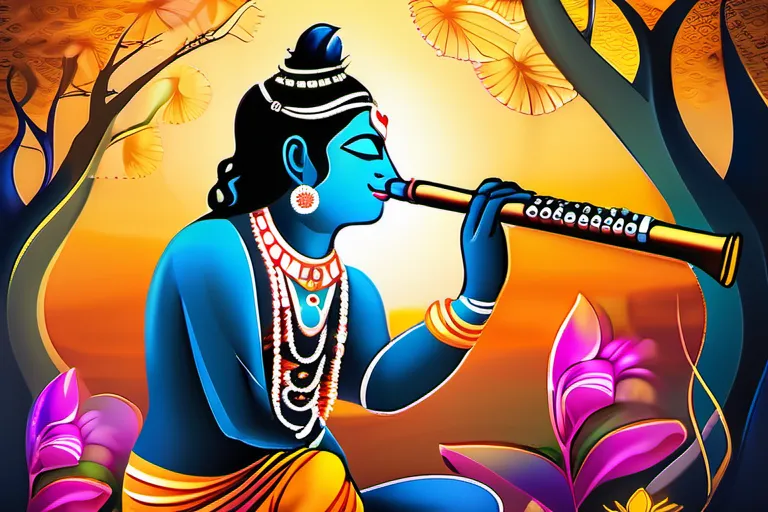Discover the incredible story of Lord Krishna – his birth, life, teachings, and enduring impact on Indian culture.
Who was Krishna? This enigmatic figure is considered one of the most important deities in Hinduism. From his miraculous birth to his legendary adventures and profound teachings, Lord Krishna’s life story offers valuable insights into the human condition and spirituality.
The Birth of the Divine
Imagine a dawn where the world paused, waiting for a moment that would change its course forever. The birth of Lord Krishna, the divine avatar, was not just the beginning of another life but the unfolding of a cosmic prophecy.
The story begins in Mathura, a city under the oppressive rule of King Kamsa. Prophecies foretold that an eighth child of Devaki and Vasudeva would be his end. Yet, these prophecies were not just warnings—they were invitations, calling forth the essence of divinity into human form.
Krishna’s birth was a spectacle woven with divine threads. As Vasudeva carried his newborn son across the perilous Yamuna River, he exchanged Krishna for the child of Devaki’s sister, who had just given birth. This exchange, a magic trick of fate, ensured that Kamsa could not claim Krishna.
The journey to Vrindavan was no ordinary trip; it was a pilgrimage through the fabric of time and space. The baby Krishna, with his divine aura, brought joy and wonder wherever he went. From lifting the Govardhan Hill to playing his flute, his every deed was imbued with magic and meaning.
But these early years were not just about play; they were lessons in life and destiny. Krishna’s role as a protector and savior was already taking shape. His encounters with demons like Balaki and the killing of Putana, though young, foreshadowed his future as an unyielding defender of righteousness.
The birth of Lord Krishna is more than just a historical event; it’s a reminder that even in the most daunting circumstances, there is always hope. It’s a tale that weaves through time, reminding us of the power within each of us to transform the world around us.
The Adventures of a Legendary Avatar
Imagine a world where heroes are born not just to fight, but to change the course of destiny itself. That’s the tale of Lord Krishna, whose adventures are as legendary as they are profound. From his very birth, Krishna was destined for greatness, marked by the prophecy that he would protect the innocent and vanquish evil.
In one of his earliest and most famous adventures, Krishna displays a courage beyond his years when he confronts a demon named Banasura. The story goes that this malevolent spirit had taken a vow to keep a girl captive in his fortress until someone could defeat him. With nothing but his divine strength and wisdom, Krishna singlehandedly slays the demon, rescuing the maiden and saving her from an oppressive fate.
But Krishna’s exploits extend far beyond battles against demons. Consider his role in defending the city of Dwarka. This magical fortress is not just a place; it’s a symbol of prosperity and peace. When faced with an attack by the demon king Kamsa, who had once tried to kill Krishna himself as a child, the divine avatar stepped forward, leading his devotees into battle.
In this climactic showdown, the skies seemed to darken, and the very elements aligned in favor of the righteous. With each arrow shot from his bow, the balance of power tipped toward Krishna’s side. The battle was fierce, but ultimately, the city of Dwarka stood victorious, its walls unbroken. This act not only saved a place but also symbolized the triumph of good over evil on a grand scale.
Through these adventures and many others, Krishna demonstrates his multifaceted nature—part warrior, part philosopher, and always a protector of the innocent. Each tale weaves together layers of spiritual depth, making it clear that Lord Krishna is not just an avatar but a divine guide for our own lives.
As we delve deeper into his teachings and the broader impact on Indian culture, one can’t help but wonder how these stories continue to inspire and shape us today. The adventures of Lord Krishna remind us that every moment holds within it the potential for heroism and transformation.
The Philosophy of Love and Duty
Imagine delving into the heart of the Bhagavad Gita, where the essence of love and duty are intertwined like the strands of a beautifully woven tapestry. In this ancient Indian scripture, Lord Krishna imparts profound teachings on what it means to live a virtuous life. How can we navigate the complexities of existence if not guided by the wisdom of such an avatar?
The Bhagavad Gita presents a dialogue between Arjuna and Krishna, set against the backdrop of the great Kurukshetra War. Through this interaction, Krishna elucidates concepts that are both deeply personal and universally applicable. He speaks of the importance of performing one’s duties without attachment to outcomes—a principle known as nishkama karma.
How does one embrace such a philosophy in their own life? Is it not akin to stepping into a garden where every flower, though seemingly identical, bears unique petals and colors, representing the varied paths of duty that each individual must follow?
Krishna’s teachings on dharma (duty) are further enriched by his understanding of rasa, or emotional engagement. He teaches us that true fulfillment comes from blending one’s sense of duty with a deep, almost divine love for all beings. Can we not see this as a reflection of the cosmic dance itself, where every step is both a duty and an expression of love?
The Bhagavad Gita also delves into the concept of bhakti (devotion), suggesting that devotion to Krishna or Bhagavan is the ultimate path. But what does this mean for us in our daily lives? Is it not about finding a higher purpose in our actions, no matter how mundane they may seem?
In essence, Krishna’s teachings are like a lighthouse guiding ships through treacherous waters. They provide clarity and direction amidst life’s tumultuous storms. By integrating the lessons of love and duty into our lives, we can navigate towards a path of righteousness and fulfillment.
The Significance of Krishna in Hindu Mythology
Imagine a divine figure who embodies both strength and compassion, wisdom and playfulness – this is Lord Krishna, one of Hinduism’s most revered avatars. In the vast tapestry of Hindu mythology, Krishna stands out not only as an incarnation of Vishnu but also as a symbol of spiritual depth and cultural richness.
How does Krishna fit into the pantheon of gods? His relationship with other deities is fascinating. He is often depicted alongside Radha and the Gopis, engaging in playful yet profound interactions that reflect his dual nature – the joyous child who grows into a wise guru. This dynamic interplay symbolizes the eternal dance between love and devotion (bhakti) and spiritual knowledge (jnana).
In the epic Mahabharata, Krishna’s role is pivotal. He serves as both advisor and charioteer to Arjuna, guiding him through ethical dilemmas with the wisdom encapsulated in the Bhagavad Gita. This text becomes a cornerstone of Hindu philosophy, discussing concepts like dharma (duty), artha (wealth), kama (desire), and moksha (liberation). Through Krishna’s teachings, we delve into the heart of the soul’s journey towards enlightenment.
Krishna’s symbolism in Indian culture is as vast as it is profound. He represents not just a deity but also an ideal human being – one who embodies virtues like selfless service (seva) and compassion. His birth story, with its miraculous elements, adds to the mystique of his divinity. How many times have we pondered over the significance of his blue skin, a symbol perhaps of purity and truth?
Through Krishna’s life and teachings, one cannot help but reflect on the human condition – the balance between the mundane and the divine, the path from ignorance to wisdom. He teaches us through his actions that true happiness lies not in material possessions but in the company of loved ones and the pursuit of spiritual knowledge.
Understanding Krishna’s role in Hindu mythology is like peeling back layers of an onion – each layer reveals more depth and complexity. From his childhood pranks to his mature wisdom, Krishna embodies the essence of Hindu philosophy. His teachings continue to resonate, guiding countless souls on their path towards spiritual fulfillment.
Lord Krishna’s Legacy and Enduring Impact
Lord Krishna’s legacy is like a sprawling garden, where every leaf and flower tells a story. Have you ever wondered how his teachings have shaped not only Hinduism but also Indian art, literature, and spirituality? His influence is as profound as it is pervasive, much like the wind that carries seeds to new lands, spreading life far beyond its origin.
Imagine walking through an ancient temple, where every sculpture whispers tales of Krishna’s divine interventions. From the intricate carvings depicting his playful moments with cows and gopis (milkmaids) to the grand narratives of his teachings, each piece is a testament to his enduring impact. In these walls, one can almost hear the echoes of Gitas, the sacred texts that guide spiritual seekers through life’s challenges.
The impact of Krishna’s legacy on Indian literature is undeniable. Think about it: Would the Bhagavad Gita be as revered without his profound wisdom? His conversations with Arjuna on the battlefield have inspired countless poets and writers, making his words a part of the very fabric of Indian literary heritage. It’s almost as if Krishna’s voice resonates through every page, offering solace and guidance to those who seek it.
But what about his relevance in contemporary times? In a world where technology seems to dominate our lives, how does Lord Krishna’s timeless wisdom still resonate? Consider this: Isn’t the message of non-attachment and finding peace within amidst chaos as relevant now as it was 5000 years ago? His teachings on Yoga, Meditation, and self-realization are not just ancient practices but tools for modern living, helping individuals navigate life’s complexities with grace.
The legacy of Lord Krishna is a beacon of hope in the darkest times. Like a lighthouse guiding ships through turbulent waters, his teachings light our path towards inner peace and wisdom. Whether it’s through the sacred verses of the Bhagavad Gita, the vibrant colors of Holi, or the timeless love songs inspired by his life, Krishna’s influence continues to inspire and uplift people across generations.
So, as we explore further into the enigmatic mystique of Lord Krishna in our next chapter, let us also ponder on how this divine avatar has left an indelible mark on human history and continues to guide souls towards enlightenment. How does his legacy shape your understanding of spirituality today?
The Enigmatic Mystique of Lord Krishna
The Enigmatic Mystique of Lord Krishna: Delve into the Enigmatic Aspects of Lord Krishna’s Character
Have you ever wondered why Lord Krishna is often depicted as a playful child with a flute, surrounded by cows? What does his love for music and nature signify in the grand tapestry of Hindu mythology?
In the Shrimad Bhagavata Purana, it is said that Lord Krishna was born into this world to play different roles, each as significant as the last. His playful nature, often seen through his pastimes like stealing butter and playing pranks on his friends, reflects a deeper spiritual essence—his embodiment of leela, or divine play.
Imagine for a moment that Lord Krishna’s love for cows is more than just a symbol of purity; it could be a metaphor for the nurturing aspect of the Divine. In the rural settings of Mathura and Vrindavan, his association with the cows is both pastoral and profound, suggesting a connection between the spiritual and the natural worlds.
The mystical melodies from his flute are not just tunes but vibrations that resonate through the very fabric of existence. How does Krishna’s music create harmony in the cosmos? Is it merely an art form or a tool for spiritual transformation?
Then there are the mysteries surrounding his life, such as the incident where he lifted Govardhan Hill to protect his people from torrential rains. Was this an act of heroism or a demonstration of cosmic power? What does this deed signify in terms of divine intervention and human resilience?
As we explore these enigmatic aspects of Lord Krishna’s character, we find that they are not just stories but profound teachings on the nature of reality and the path to spiritual enlightenment. Could his life be seen as a guidebook for living authentically and joyfully in this world?
The answers lie within each of us, waiting to be discovered through meditation, devotion, and self-reflection. In understanding Lord Krishna’s enigmatic qualities, we might just uncover the key to our own spiritual journey.
Conclusion
 Explore the timeless wisdom and enduring impact of Lord Krishna’s teachings on love, duty, and the pursuit of a virtuous life. Delve into the significance of this divine avatar in Hindu mythology and culture.
Explore the timeless wisdom and enduring impact of Lord Krishna’s teachings on love, duty, and the pursuit of a virtuous life. Delve into the significance of this divine avatar in Hindu mythology and culture.











